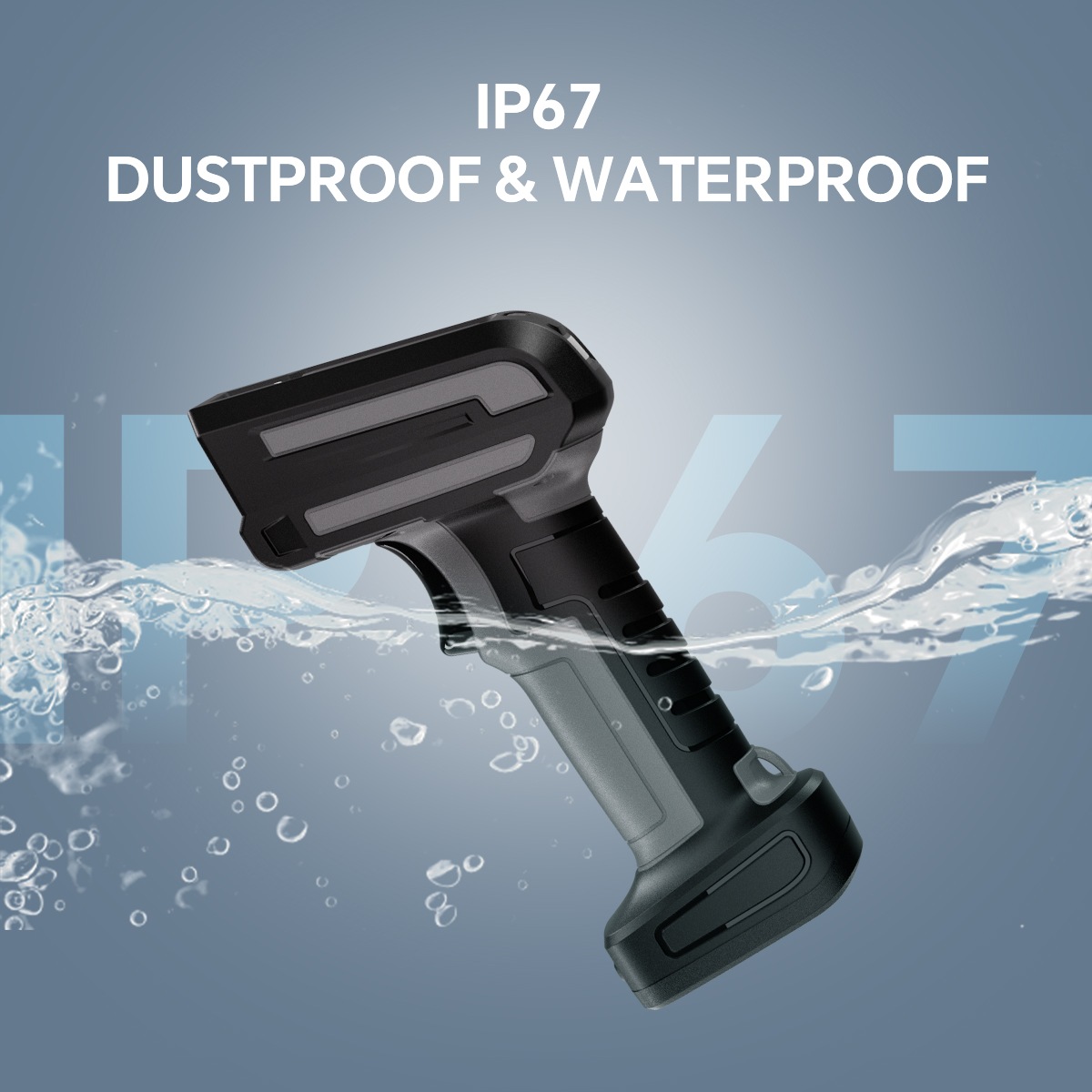Barcode scanning, as a core data collection link throughout the manufacturing process, often encounters obstacles due to the unique nature of the environment, which can easily lead to production interruptions and data errors. These core issues can be categorized into four categories:
1. Harsh Environmental Interference with Scanning
The physical environment in the workshop is the primary challenge: Oil, dust, and moisture adhere to or erode barcodes, hindering recognition. Extreme lighting (low brightness, strong light, and reflections) reduces barcode contrast, preventing barcode scanners from capturing clear outlines. Electromagnetic interference generated by large equipment can also disrupt wireless scanner signal transmission, causing reading delays. Industrial barcode scanner quality directly impacts recognition: First, poor printing. Low-quality labels/inks can lead to insufficient barcode contrast and blurred edges. DPM barcodes can also suffer from insufficient engraving depth or incomplete information due to oxidation.
Second, wear and deformation.
Friction during transport and assembly, or shrinkage in high-temperature environments, can damage and distort barcode proportions. Third, inconsistent specifications. Different vendors use different barcode symbologies (such as Code 128 and QR codes). Incompatible equipment can lead to some scanning but others not being able to.
Third, Inadequate Equipment Adaptability and Stability
Barcode scanner performance flaws hinder efficiency: Incompatible protection levels mean that standard commercial equipment (IP42) cannot meet the IP65+ requirements of workshops and are easily damaged by dust and liquids. Decoding capabilities are weak, as traditional equipment lacks intelligent repair features, requiring repeated attempts to detect blurred barcodes. Connectivity and battery life are poor. Wireless devices are prone to lag and disconnection due to frequency conflicts. Insufficient battery life requires frequent charging, causing production line downtime.
Fourth, the gap between barcode scanning and process integration
The lack of seamless integration of barcode scanning with production leads to two major issues: data synchronization delays. Some devices only store data locally, requiring manual export to ERP/MES systems, resulting in delayed updates of inventory and process status. Poor adaptability across multiple scenarios means a single device struggles to handle both continuous and rapid scanning on the assembly line and remote scanning in the warehouse, forcing companies to purchase multiple devices, increasing costs. High operational barriers to entry and complex debugging of older equipment can lead to parameter errors and scanning failures due to lack of proficiency.
Netum Industrial barcode scanner: Solving the Barcode Scanning Challenge in Manufacturing

Barcode scanning is a critical step in manufacturing production lines. From the receipt of raw materials and processing of parts to the assembly and shipment of finished products, accurate barcode reading is essential at every step. However, real-world production environments are often complex, with factors such as oil, wear, and poor lighting often causing barcodes to become blurred, presenting significant challenges. Traditional barcode scanners are prone to misidentification or even failure to read these "problem barcodes," which can impact production line smoothness, reduce productivity, and increase operating costs.
Netum industrial barcode scanners are designed to handle the complex working conditions of the manufacturing industry. They utilize advanced image recognition technology and a high-resolution CMOS sensor to keenly capture barcode details. Even when oil stains are present on the barcode surface, their specialized optical design and image processing algorithms effectively filter out the interference caused by the oil and accurately identify the barcode content. For example, in automotive parts manufacturing workshops, metal components such as engine blocks can become stained with oil during processing. Netum industrial-grade barcode scanners can quickly penetrate the oil and clearly read traceability barcodes on the components, ensuring traceability throughout the production process.
Netum industrial barcode scanner also excel at handling blurred and damaged barcodes. They feature powerful built-in decoding algorithms and intelligent repair and error correction capabilities. When scanning worn, torn, or illegible barcodes, the algorithm automatically fills in missing parts and corrects erroneous information by analyzing the barcode's overall characteristics, enabling accurate decoding. In the electronics manufacturing industry, barcodes on small electronic components are prone to blurring and wear due to their small size and frequent use. Netum's industrial barcode scanners, with their superior decoding capabilities, easily address this challenge, ensuring accurate identification and efficient flow of electronic components along the production line.
Netum's industrial barcode scanners also offer excellent environmental adaptability. They automatically adjust exposure and contrast to capture clear barcode images in production environments, whether dimly lit or exposed to direct sunlight. Furthermore, with a high level of protection, the scanners are dustproof, waterproof, and drop-resistant, ensuring stable operation in harsh industrial environments. This significantly reduces device failure rates and minimizes production interruptions caused by equipment maintenance.
Netum's industrial barcode scanners, with their advanced technology and reliable performance, effectively address barcode scanning challenges on manufacturing production lines. Whether it's greasy dirt, blurred codes, or complex environmental factors, they can accurately recognize barcodes. This not only improves production efficiency and ensures a smooth production process, but also provides strong support for enterprises to achieve digital management and intelligent manufacturing. For manufacturing companies, Netum industrial-grade barcode scanners are undoubtedly a powerful tool for enhancing production competitiveness.
The Netum GY series of industrial barcode scanners, including the Netum GY80U ultra-durable industrial-grade wireless DPM barcode scanner (including charging base), offer excellent scanning performance and environmental adaptability. It can accurately read a variety of challenging barcodes, including hollow codes on PCB circuit boards, laser-etched codes on reflective metals, pin-punched codes on castings, codes engraved on oily surfaces, laser-etched codes on resins, and codes laser-engraved on cylindrical objects. Its 1.3 million pixel resolution enables it to scan barcodes as small as 3 mils, and it can accurately identify 1D and 2D barcodes, QR codes, DataMatrix, and PDF417 codes on paper and screens, even blurry, damaged, and dirty barcodes. Constructed of rugged ABS with a thickened soft TPU protective layer, it passes the IP67 waterproof and dustproof test and can withstand drops from a height of 3 meters, ensuring stable operation in harsh environments such as dusty warehouses, humid and rainy conditions.
This scanner also takes into account long-lasting use and wide compatibility: Designed for all-day operation, it comes with two removable 3200mAh batteries and a charging dock. The dock can simultaneously charge the backup batteries and the device's internal battery, eliminating battery life interruptions. It offers flexible connectivity, supporting 2.4G wireless, Bluetooth, and wired modes. It is compatible with Windows, Mac, iOS, Android, iPad OS, and Linux, and supports multiple data transmission protocols including USB HID (USB COM), RS232, and Bluetooth (HID, SPP, and BLE), meeting scanning and data exchange needs in diverse scenarios.


